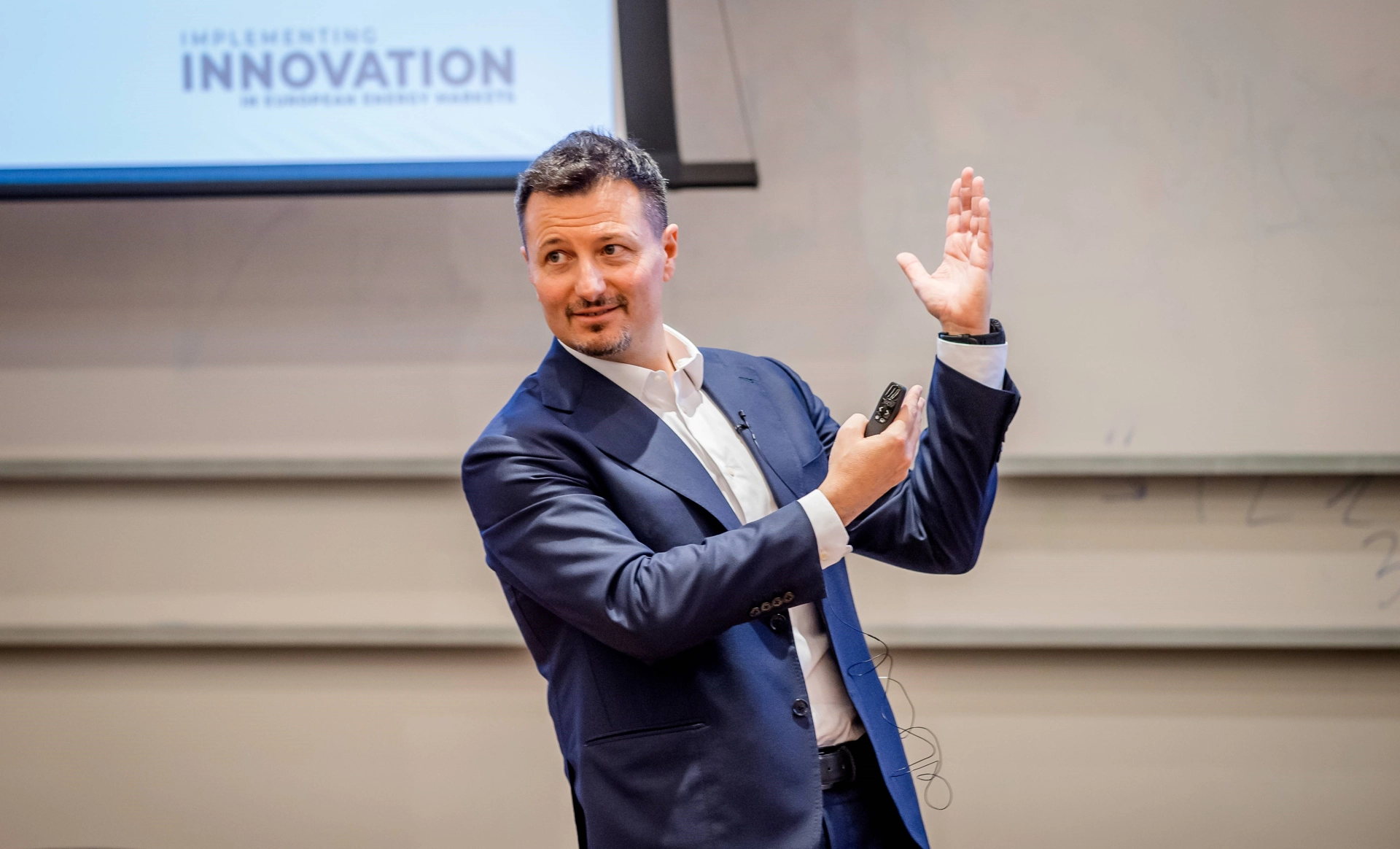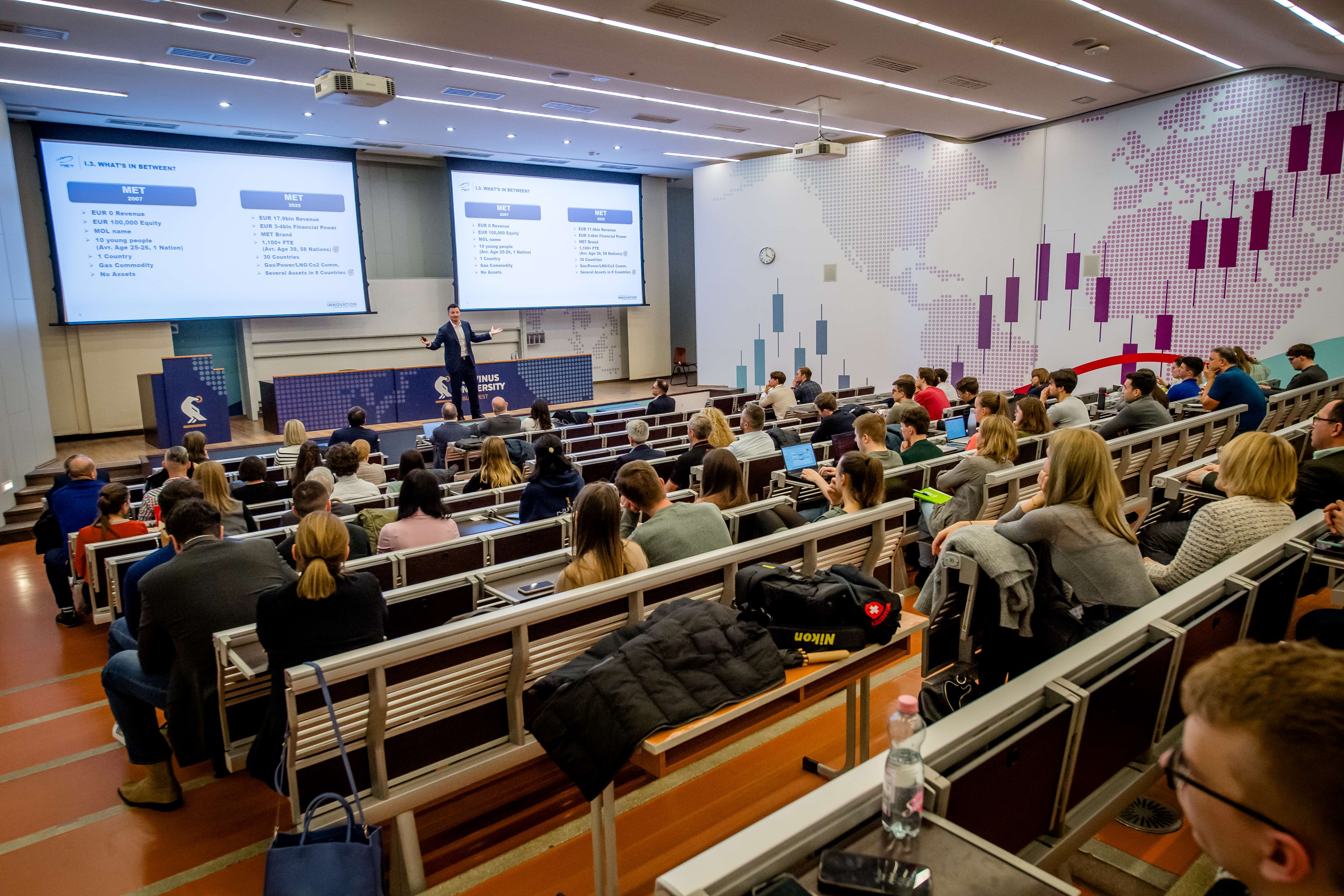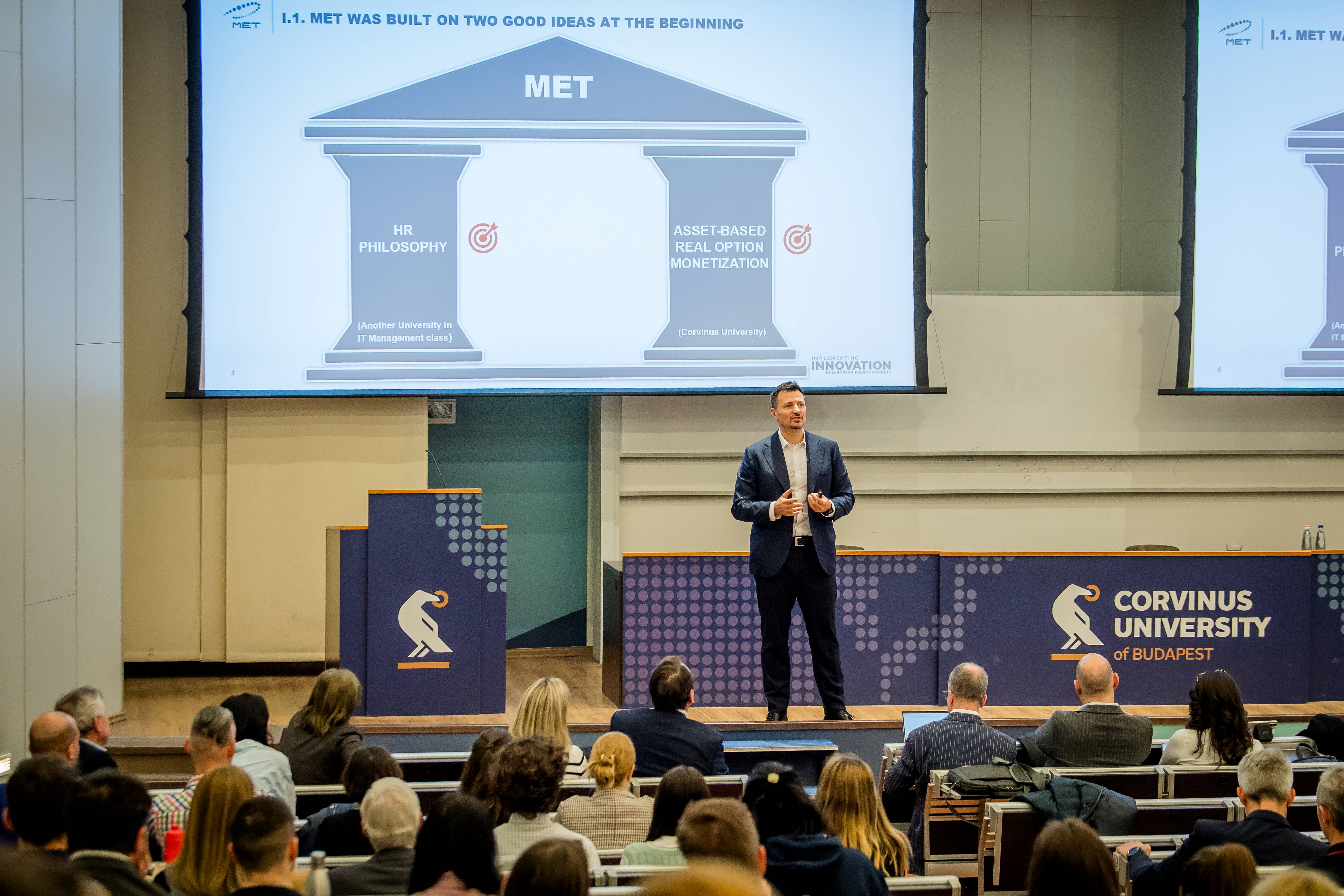
Original article in Hungarian: Tudás.hu
In less than two decades, MET Group has shown incredible international growth on the continent and beyond: the Swiss-based European integrated energy company now has subsidiaries in 17 countries, and a presence in 30 national gas markets and 39 international trading points. The company is now 90 percent owned by MET employees and 10 percent by Keppel Infrastructure.
This was the second time this year that Benjamin Lakatos, who also graduated in Finance from Corvinus, gave a lecture to Corvinus University students. During his presentation, he highlighted two key university experiences for students that shaped his leadership thinking and later had a profound impact on the way he built MET.
One piece of advice he heard in an IT management course in the US was from a successful entrepreneur who had just finished his management career: in a fast-changing world, you don't hire the best experts to start a new, hitherto unknown business but, rather, alongside an experienced leader with a track record, you hire high-performing, success-hungry, motivated young talent who should be given the space to grow. Lakatos stressed that this principle is the basis of MET Group's HR success to date. However, he warned that this approach is not universally applicable, especially in already stable economic structures.
Another important lesson was the theory of real options learned at Corvinus. This approach points out and advises companies to be flexible in their investment decisions, taking into account uncertainty and flexibility of decisions rather than sticking to a single pre-defined strategy. Lakatos said that as a finance professional, the practice of pricing options was deeply ingrained in him, and he used it continuously later in his career, mapping market situations with simple option models.
"I have been using this practice ever since. I see every situation as an option."
Change in the energy market
However, another key factor in the successful launch of MET Group was the significant changes that took place in the European energy market in the 2000s. The unbundling of the activities of vertically integrated companies - the separation of energy production, transmission and sales - required by the EU to increase competition and protect consumers, created new opportunities. Lakatos put it graphically: an engineering-focused security of supply industry was transformed into a financial industry in practically a single day. It was in this new field that MET found its niche and became a success story in a short time.
Originally a natural gas trader, the company now also trades LNG and electricity, and has a significant portfolio of energy generation assets including reservoirs, power plants, solar and wind farms.
Today, MET Group is still one of the smaller ones among the largest energy players in Europe, but the aim is to become one of the largest within a few years. Lakatos was proud to say that by now MET has become a recognised brand in Western Europe, where it is a partner of choice for major energy companies and is now being approached by London-based financing banks - and not the other way around.
Lakatos attributed the success to his colleagues, pointing out that the HR management style that has been systematically followed for years has brought success. He recalled that the company started as a real "garage company" with the involvement of ten young people in their twenties under the MOL umbrella.
Although it was founded by young Hungarians, the company has grown to a global company of 1100 people, with colleagues of 58 different nationalities, 58 different cultural backgrounds and ways of thinking. According to Lakatos, creating a common corporate culture under such conditions was more difficult than ever, but when it is achieved, such diversity gives you unsurpassed strength.
Challenges and failures
But MET Group's history is not all success, it has faced serious challenges. Lakatos stressed that this is part of the entrepreneurial attitude, and that the best lessons can be learned from failure. MET also faced problems to solve, especially in the field of asset operations, the actual running of the assets was a new area for them, which they are constantly learning.
The challenge in HR has been that in functional areas, where there are established professions, the approach of hiring young, success-oriented talent does not work, but rather buying expertise by hiring experienced professionals does. They hired tax experts, accounting experts, finance colleagues, which gradually started to solve their problems. This, however, resulted in cultural differences between colleagues in the business and functional areas within the company, which was a new challenge to bridge and transform into a unified organisation.
Ten-year target
Benjamin Lakatos also gave some leadership advice to Corvinus students. He says it is important to set a ten-year goal that gives direction to the company or the individual, even if the steps to achieve it may change daily. And, of course, hard work is not something you can get away from: at MET, the career opportunities are almost limitless, but the expectations for performance are also high.
Knowing the strengths and weaknesses of an organisation and choosing your battles wisely are essential to building a business - pick your fights! Only those "battles" should be undertaken where the strengths of the organisation can win the day. If the battles find you, your chances are much smaller. And knowing the weaknesses will help you to avoid being exposed to attacks and, if necessary, you must address them with the help of experts.

Corporate culture
The importance of creating a corporate culture cannot be overstated. Culture determines what the organisation accepts and rejects.
According to Lakatos, management decisions can be based on trust or on fear. Although fear-based leadership can deliver quick results in the short term, excellent long-term performance can only be achieved through trust-based leadership. In the case of MET, where many colleagues from different cultural backgrounds work together, building a culture of trust has been time-consuming, but well worth the effort. At the same time, it is important that trust-based leadership should not come at the expense of performance.
Some good advice
Finally, Lakatos also gave some practical advice to the students. He said it was important to give colleagues space, avoid micro-management and not interfere in everything. "If a blindfolded man has to build a tower of cubes as high as possible, the best people are those who are left to work freely. If they are controlled, the result will almost certainly be worse."
Competition is essential to achieve more performance, but you need to avoid unclean competition. Communicate constantly with colleagues, which is essential in a trust-based company culture. Hard work is a given, and it's also good to have skills where we are better than others, especially the previous generation. It's useful to make a priority list, so we don't get lost in the mass of tasks and it will keep us oriented.
And knowing the extent of risk-taking and learning from failure helps us to assess where our limits are. Mistakes and failures don't matter, what matters is who can always get up and start again. In fact, this is where we can learn the most. Corporate management is not like sport, where there are skills that cannot be learned later. There are no permanent winners and losers in management. It depends on the situation, who wins and loses when. It can happen at the same time.
And what is the point of all this? Why be better and better?
Benjamin Lakatos drew the students' attention to a very important economic process at the end of his presentation. The European Union has increased its nominal GDP by 36% since 2007. The US has roughly doubled it, and China has quadrupled it.
Europe is clearly lagging behind, slowing down, getting comfortable. If this continues, in 50 years the European Union will have no impact on the world economy.
Benjamin Lakatos emphasised: "If it stays like this, your children will no longer have any say in global processes. Change that, prepare for it not to be."

